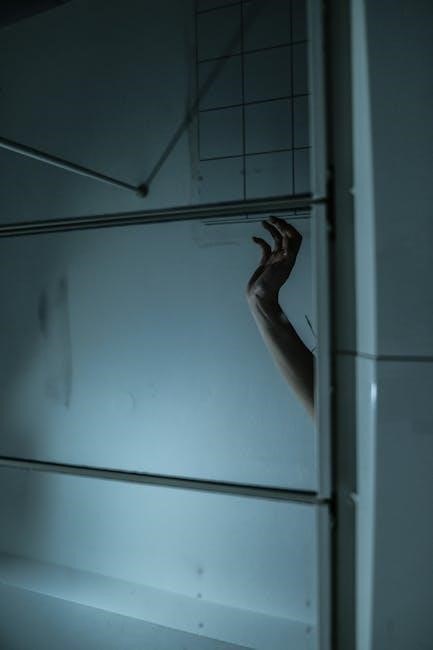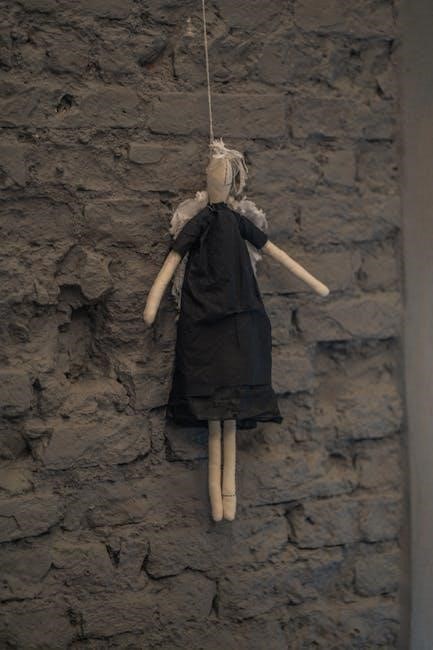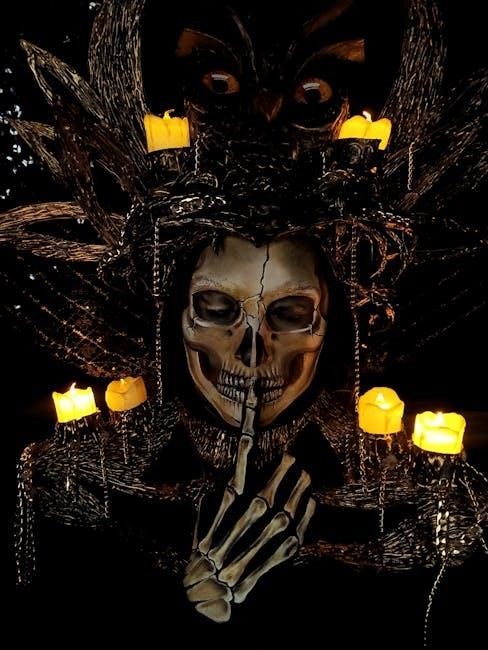
Dread PDF is a unique RPG system using a Jenga tower instead of dice, creating tense, collaborative horror stories. It emphasizes storytelling and atmosphere over complex rules.
Overview of the Dread RPG System
Dread RPG is a rules-light, collaborative horror storytelling game that relies on a Jenga tower for tension and conflict resolution. Designed to focus on atmosphere and narrative, it strips away complex rules, letting players and the GM craft terrifying stories together. The system emphasizes player agency and the unpredictability of the Jenga mechanic, which adds a physical element to gameplay. Dread is versatile, allowing for quick character creation and customization, and it thrives on the shared experience of horror, making it a unique and engaging tabletop RPG for fans of the genre.
Importance of PDF in Modern Tabletop Gaming
PDFs have revolutionized tabletop gaming by making rules, expansions, and supplements like Dread: Dredd and the Elite Dangerous RPG Exploration Supplement easily accessible. Players can instantly download and share materials, reducing costs and storage needs. PDFs also enable quick updates and revisions, ensuring everyone has the latest version. For horror RPGs like Dread, PDFs provide a convenient way to distribute eerie atmospherics, character sheets, and tools. This format has become essential for modern gaming, offering flexibility and accessibility for both creators and players worldwide.

Core Mechanics of Dread
Dread uses a Jenga tower to resolve actions, creating tension as players pull blocks. The rules-light system emphasizes collaborative storytelling and atmosphere, focusing on horror narratives.
The Jenga Tower Mechanic
The Jenga tower is Dread’s core mechanic, replacing dice with physical tension. Players pull blocks from the tower to resolve actions, creating suspense as the structure becomes unstable. Each pull heightens anxiety, mirroring the horror theme. The tower’s collapse can lead to dramatic consequences, such as character death or plot progression. This unique system eliminates the need for complex rules or numerical calculations, keeping gameplay fluid and focused on storytelling. The Jenga mechanic ensures every decision feels risky and impactful, making it a central element of Dread’s immersive and collaborative horror experience.
Rules-Light System for Horror Storytelling
Dread’s rules-light system streamlines gameplay, focusing on storytelling and collaboration. By minimizing complex mechanics, the game emphasizes character development and narrative depth, allowing players to craft terrifying tales collectively. The flexible system adapts to any horror setting, enabling GMs to create unique scenarios based on player choices. This approach ensures each session is distinct, with the Jenga tower adding physical tension that mirrors the game’s eerie atmosphere. Dread’s design empowers creativity, making it easy for newcomers to engage while offering depth for experienced players, ensuring a memorable horror experience shaped by collective decisions.

Character Creation in Dread
Character creation in Dread is streamlined, focusing on narrative depth over complex stats. Players craft unique characters through collaborative storytelling, with the Jenga tower adding tension to their fates.
Streamlined Character Design
Dread’s character design is intentionally minimalist, focusing on narrative and emotional depth rather than complex stats. Players create characters through collaborative storytelling, with the Jenga tower adding tension to their actions and decisions. The system emphasizes player-driven narratives, allowing for deep personalization without cumbersome rules. Characters are defined by their backstory, fears, and motivations, making them relatable and immersive in the horror setting. This approach ensures that gameplay remains fluid and focused on atmosphere, while still providing meaningful character development and engagement for players.
Customization Options for Players
Dread PDF offers flexible character customization, allowing players to craft unique roles tailored to their preferences. While the system avoids traditional classes or complex stats, players can define their characters through detailed backstories, fears, and personal motivations. The collaborative storytelling nature of Dread enables players to shape their characters’ personalities and arcs dynamically during the game. This narrative-driven approach ensures that each character feels distinct and integral to the horror experience. Players can also explore various themes and settings, making Dread adaptable to a wide range of horror subgenres and creative interpretations.

Notable Supplements and Expansions
Dread PDF includes notable expansions like Dread: Dredd, linking the RPG to the Judge Dredd universe, and the Elite Dangerous RPG Exploration Supplement, enhancing space horror.
Dread: Dredd and Its Connection to 2000 AD
Dread: Dredd is a unique supplement that merges the Dread RPG system with the iconic universe of 2000 AD, specifically the Judge Dredd franchise. Designed by Epidiah Ravachol, the original creator of Dread, this ENNIE award-winning title brings the tense, collaborative horror mechanics of the game into the gritty, dystopian world of Mega-City One. Players take on the roles of Judges, navigating the dark, satirical narrative of the 2000 AD universe. The supplement retains Dread’s signature Jenga tower mechanic, emphasizing storytelling and player collaboration. It offers a fresh way to explore the struggles of law enforcement in a chaotic, cyberpunk future, blending horror and sci-fi elements seamlessly.
Elite Dangerous RPG Exploration Supplement
The Elite Dangerous RPG Exploration Supplement is a 55-page PDF designed for $9.99, offering detailed scenarios and spacecraft for immersive cosmic adventures. It enhances gameplay by focusing on exploration and discovery, aligning with Dread’s tense atmosphere. Players explore uncharted worlds, encounter mysterious phenomena, and face hidden dangers. The supplement provides tools for creating unique storylines and encounters, allowing Game Masters to craft tailored adventures. Its modular design ensures each journey through the galaxy is distinct and engaging, expanding the game’s depth while maintaining its core mechanics.

Community and Resources
Dread PDF fosters a vibrant community with free play variants and customizable character sheets. Players and creators share mods and content, supported by publishers like Dread XP.
Free Play Variants for Dread
Free Play Variants for Dread offer creative twists on the core game, allowing players to explore new themes and mechanics. These variants, often shared by the community, provide fresh ways to experience the horror RPG. From alternate rulesets to unique scenarios, they keep gameplay dynamic and engaging. Players can discover these variants through online forums, blogs, and community-driven platforms, enhancing their Dread experience with customizable options and innovative ideas. These resources highlight the game’s versatility and the dedication of its fanbase, ensuring endless possibilities for horror storytelling.
Character Sheets and Tools for Players
Character sheets and tools for Dread are essential for streamlining gameplay and enhancing player experience. Official and community-created PDFs are widely available, offering customizable templates to suit various playstyles. These tools often include sections for character creation, skill tracking, and narrative notes. Players can download these resources from platforms like DriveThruRPG or community forums. Additional tools, such as digital character builders and reference guides, help organize gameplay and provide quick access to rules. These resources ensure players and Game Masters can focus on crafting immersive horror stories without getting bogged down by complex record-keeping.

Dread Delusion
Dread Delusion, developed by Lovely Hellscape Studio and published by DreadXP, offers a unique blend of exploration, discovery, and horror elements, captivating players with its immersive atmosphere.
Overview of the Game Dread Delusion
Dread Delusion is a captivating indie horror game developed by Lovely Hellscape Studio and published by DreadXP. It offers a unique blend of exploration, discovery, and horror elements, immersing players in a haunting atmosphere. The game features a distinctive visual style and a narrative that emphasizes mystery and tension. Players explore eerie, abandoned locations, uncovering dark secrets and confronting unsettling encounters. Dread Delusion’s design focuses on creating a sense of dread through its environment and storytelling, making it a standout title in the horror genre. Its engaging gameplay and atmospheric sound design have drawn praise from players seeking immersive horror experiences.
Development by Lovely Hellscape Studio
Lovely Hellscape Studio, led by UK-based animator and artist James Wragg, is the creative force behind Dread Delusion. Known for its unique approach to horror game design, the studio focuses on crafting immersive, atmospheric experiences. Dread Delusion showcases the studio’s ability to blend exploration, mystery, and horror elements seamlessly. With a passion for lo-fi aesthetics and storytelling, Lovely Hellscape Studio has carved a niche in the indie horror scene. The studio’s work is characterized by its attention to detail and commitment to evoking a sense of dread through environment and narrative, making it a standout developer in the genre.

Gameplay and Features
Dread Delusion combines exploration, mystery, and horror, offering a unique blend of atmospheric storytelling and immersive gameplay. Its design emphasizes discovery and tension, creating a captivating experience.
Exploration and Discovery Mechanics
Exploration is a cornerstone of Dread Delusion, where players uncover hidden truths in eerie, atmospheric environments. The game encourages collaborative storytelling, allowing players to shape the narrative through their decisions and actions. The Jenga tower mechanic adds a layer of tension, as each pull heightens the risk of failure, keeping players on edge. This system seamlessly integrates with the horror theme, creating moments of suspense and unpredictability; The emphasis on discovery ensures that every interaction feels meaningful, drawing players deeper into the haunting world. The blend of exploration and mechanics fosters an immersive experience, making Dread Delusion a standout in horror RPGs.
Horror Elements and Atmosphere
Dread Delusion masterfully crafts a chilling atmosphere, immersing players in a world of psychological terror and supernatural dread. The game’s horror elements are deeply intertwined with its mechanics, using the Jenga tower to build suspense and tension. Players experience heightened anxiety as the tower’s instability mirrors the escalating horror. The game’s adaptability allows for varying levels of horror, from subtle psychological scares to overt supernatural threats. Eerie environments and unsettling narratives create a sense of immersion, drawing players into a terrifying world. Dread Delusion excels at evoking fear through its unique blend of mechanics and storytelling.

Reception and Reviews
Dread PDF has garnered significant praise for its innovative mechanics and immersive horror storytelling. Critics highlight its ability to evoke tension and fear through the Jenga tower system, while players appreciate its rules-light approach. The game’s adaptability to various horror themes has also been commended, making it a standout title in the RPG genre. Overall, Dread PDF is celebrated for its unique blend of simplicity and depth, offering a thrilling experience for horror enthusiasts.
Critic and Player Feedback on Dread Delusion
Dread Delusion has received positive feedback for its unique horror elements and immersive atmosphere. Critics praise its exploration mechanics and ability to evoke fear, while players appreciate its engaging storytelling. The game’s visual style and sound design have been highlighted as standout features, creating a chilling experience. However, some critics note that the game’s final act falters slightly in maintaining tension. Overall, Dread Delusion is celebrated for its originality and ability to deliver a memorable horror adventure, making it a notable entry in the indie horror RPG genre.
Comparison with Other Horror Games
Dread Delusion stands out among horror games for its unique blend of exploration and psychological tension. Unlike traditional RPGs, it emphasizes atmosphere over combat, creating a slower, more immersive experience. Compared to games like Amnesia or Outlast, Dread Delusion focuses less on jump scares and more on building dread through environmental storytelling. Its indie roots and lo-fi aesthetic set it apart from AAA horror titles, offering a fresh perspective on the genre. Fans of narrative-driven horror will find Dread Delusion a compelling alternative to more action-oriented games, with its focus on discovery and emotional depth.

Cultural Impact
Dread’s innovative Jenga mechanic and rules-light design have influenced modern RPG storytelling, inspiring community-driven content and fostering a culture of collaborative horror narratives and game design.
Dread’s Influence on Modern RPG Design
Dread’s innovative use of the Jenga tower mechanic has reshaped modern RPG design, emphasizing tension and collaborative storytelling. Its rules-light approach has inspired designers to focus on narrative depth and player agency, shifting the focus from complex mechanics to immersive experiences. The game’s success has encouraged the creation of community-driven content and mods, fostering a culture of creativity and experimentation. Dread’s influence is evident in the growing popularity of horror-themed RPGs and the adoption of unconventional resolution systems, proving its lasting impact on the evolution of tabletop gaming.
Community-Driven Content and Mods
The Dread community has flourished through user-created content and mods, expanding the game’s possibilities. Fans have developed free play variants, character sheets, and custom tools, fostering creativity and accessibility. Supplements like Dread: Dredd and the Elite Dangerous RPG Exploration Supplement highlight the game’s versatility. Players actively share their own horror scenarios and mods, keeping the game fresh and dynamic. This collaborative spirit has solidified Dread’s reputation as a platform for innovative storytelling, encouraging players to contribute and evolve the game together.

Future of Dread
The future of Dread PDF looks promising, with anticipation building for upcoming updates and expansions. Community-driven initiatives and potential spin-offs continue to fuel excitement and innovation.
Upcoming Updates and Expansions
Dread continues to evolve with new content, including the Elite Dangerous RPG Exploration Supplement, offering fresh gameplay mechanics. Lovely Hellscape Studio hints at potential sequels to Dread Delusion, building on its horror legacy. Community-driven expansions and mods are thriving, with fans creating unique scenarios. Updates aim to enhance character customization and deepen the horror atmosphere, ensuring Dread remains a cornerstone of tabletop terror. These developments promise to keep the game dynamic and engaging, catering to both veterans and newcomers alike. The future of Dread looks bright, with creativity and innovation at its core.
Potential for New Spin-Offs and Sequels
Dread’s success has sparked interest in new spin-offs and sequels, with fans and developers exploring fresh horror themes. The connection to 2000 AD’s Judge Dredd in Dread: Dredd suggests potential for more crossover stories. Elite Dangerous RPG’s exploration supplement hints at sci-fi horror expansions. Players clamor for sequels to Dread Delusion, seeking deeper dives into its eerie worlds. With its adaptable system, Dread could venture into new genres, from supernatural mysteries to psychological terror. The game’s horror legacy and creative freedom make it a prime candidate for exciting new iterations, keeping players eager for what’s next.
Dread PDF has redefined tabletop RPGs with its innovative Jenga tower mechanic and immersive storytelling. Its rules-light system and focus on horror have inspired a dedicated community, fostering creativity and collaboration. Supplements like Dread: Dredd and Elite Dangerous RPG showcase its versatility, while Dread Delusion pushes boundaries in digital horror experiences. The game’s cultural impact is evident in its influence on modern RPG design and the wealth of community-driven content. As Dread continues to evolve, its potential for new spin-offs and sequels ensures it will remain a cornerstone of horror gaming, leaving players eager for the next chilling adventure.